David Seymour. Retrospettiva

© David Seymour / Magnum Photos | David Seymour, Un bambino di una famiglia numerosa con una bambola fatta in casa, Vienna, 1948
Dal 3 April 2014 al 14 September 2014
Torino
Luogo: Palazzo Reale
Indirizzo: piazzetta Reale 1
Orari: da martedì a domenica 8.30-19.30
Enti promotori:
- Magnum Photos
- Direzione Regionale per i Beni Culturali e Paesaggistici del Piemonte
Costo del biglietto: intero € 8, ridotto € 5
Telefono per informazioni: +39 011 5220411
E-Mail info: sbap-to.comunicazione@beniculturali.it
Sito ufficiale: http://www.beniarchitettonicipiemonte.it
Dal 3 aprile al 14 settembre 2014 Palazzo Reale di Torino ospita una nuova retrospettiva organizzata dalla Silvana Editoriale in collaborazione con Magnum Photos e la Direzione Regionale per i Beni Culturali e Paesaggistici del Piemonte, dedicata a uno dei più leggendari fotoreporter del XX secolo: David Seymour (1911-1956) co-fondatore nel 1947 dell’agenzia Magnum Photos insieme a Henri Cartier-Bresson e Robert Capa.
Il percorso espositivo si compone di 127 fotografie in bianco e nero, suddivise in 9 sezioni (Francia, La Guerra Civile in Spagna, Germania, L'Europa dopo la Seconda guerra mondiale, I bambini della guerra, Israele, Egitto, Celebrità, Ritratti di Chim), che illustrano le tappe fondamentali dell'intensa carriera di Seymour.
David Seymour, nome d'arte di David Szymin – in seguito abbreviato nello pseudonimo Chim –, è nato a Varsavia il 20 novembre 1911 da una famiglia benestante di ebrei polacchi. Dopo gli studi in arti grafiche a Lipsia, ha iniziato la carriera fotografica a Parigi nel 1933, dove è diventato amico di Robert Capa e Henri Cartier-Bresson, con cui ha fondato nel 1947 l’agenzia Magnum Photos, alla quale si aggiunsero successivamente George Rodger e William Vandivert.
Intellettuale umanista, appassionato di politica, conoscitore di sei lingue, David Seymour è uno dei primi fotoreporter di guerra: ama considerarsi un artigiano della fotografia, non un artista; utilizza una macchina fotografica all’avanguardia, una Leica 35mm, per riuscire a rendersi anonimo nel momento dello scatto e poter così immortalare persone e fatti nella maniera più autentica possibile, spingendosi fin nel cuore dell’azione.
Segue i più significativi eventi politici dell’epoca per importanti riviste, tra cui “Life” e “Regards”, a cominciare dalla Guerra Civile in Spagna, durante la quale scatta la celebre foto della madre che allatta il suo bambino nel corso di una manifestazione contadina, diventata inconsapevolmente un simbolo e un’icona di quella rivolta.
Allo scoppio della Seconda guerra mondiale, ripara a New York, ma riesce a tornare in Europa nel 1943 arruolandosi nella US Air Force, con il delicato compito di fotointerprete delle immagini aeree.
Documenta il suo tempo senza riserve, nutrito da una forte coscienza sociale che lo porta a non sottrarsi mai, nemmeno di fronte alla difficoltà di raccontare l’infanzia rubata degli orfani di guerra: in questi scatti riversa tutta la sua sensibilità ed empatia. La sua serie più celebre è infatti I bambini della guerra, realizzata per l’Unicef negli anni del dopoguerra. Si tratta di immagini toccanti, che hanno attirato l’attenzione dell’opinione pubblica sull’incredibile numero di bambini orfani, mutilati fisicamente e spiritualmente.
David Seymour è stato ucciso a Suez nel 1956, mentre stava preparando un servizio per "Newsweek” sul conflitto arabo-israeliano.
La mostra è accompagnata da un volume edito Silvana Editoriale che comprende una selezione di fotografie e a un contributo critico di Francesco Zanot.
Il percorso espositivo si compone di 127 fotografie in bianco e nero, suddivise in 9 sezioni (Francia, La Guerra Civile in Spagna, Germania, L'Europa dopo la Seconda guerra mondiale, I bambini della guerra, Israele, Egitto, Celebrità, Ritratti di Chim), che illustrano le tappe fondamentali dell'intensa carriera di Seymour.
David Seymour, nome d'arte di David Szymin – in seguito abbreviato nello pseudonimo Chim –, è nato a Varsavia il 20 novembre 1911 da una famiglia benestante di ebrei polacchi. Dopo gli studi in arti grafiche a Lipsia, ha iniziato la carriera fotografica a Parigi nel 1933, dove è diventato amico di Robert Capa e Henri Cartier-Bresson, con cui ha fondato nel 1947 l’agenzia Magnum Photos, alla quale si aggiunsero successivamente George Rodger e William Vandivert.
Intellettuale umanista, appassionato di politica, conoscitore di sei lingue, David Seymour è uno dei primi fotoreporter di guerra: ama considerarsi un artigiano della fotografia, non un artista; utilizza una macchina fotografica all’avanguardia, una Leica 35mm, per riuscire a rendersi anonimo nel momento dello scatto e poter così immortalare persone e fatti nella maniera più autentica possibile, spingendosi fin nel cuore dell’azione.
Segue i più significativi eventi politici dell’epoca per importanti riviste, tra cui “Life” e “Regards”, a cominciare dalla Guerra Civile in Spagna, durante la quale scatta la celebre foto della madre che allatta il suo bambino nel corso di una manifestazione contadina, diventata inconsapevolmente un simbolo e un’icona di quella rivolta.
Allo scoppio della Seconda guerra mondiale, ripara a New York, ma riesce a tornare in Europa nel 1943 arruolandosi nella US Air Force, con il delicato compito di fotointerprete delle immagini aeree.
Documenta il suo tempo senza riserve, nutrito da una forte coscienza sociale che lo porta a non sottrarsi mai, nemmeno di fronte alla difficoltà di raccontare l’infanzia rubata degli orfani di guerra: in questi scatti riversa tutta la sua sensibilità ed empatia. La sua serie più celebre è infatti I bambini della guerra, realizzata per l’Unicef negli anni del dopoguerra. Si tratta di immagini toccanti, che hanno attirato l’attenzione dell’opinione pubblica sull’incredibile numero di bambini orfani, mutilati fisicamente e spiritualmente.
David Seymour è stato ucciso a Suez nel 1956, mentre stava preparando un servizio per "Newsweek” sul conflitto arabo-israeliano.
La mostra è accompagnata da un volume edito Silvana Editoriale che comprende una selezione di fotografie e a un contributo critico di Francesco Zanot.
SCARICA IL COMUNICATO IN PDF
COMMENTI

-
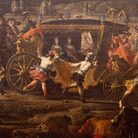 Dal 20 December 2025 al 20 April 2026
Caserta | Reggia di Caserta
Dal 20 December 2025 al 20 April 2026
Caserta | Reggia di Caserta
Regine: trame di cultura e diplomazia tra Napoli e l’Europa
-
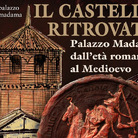 Dal 19 December 2025 al 23 March 2026
Torino | Palazzo Madama - Museo Civico d’Arte Antica
Dal 19 December 2025 al 23 March 2026
Torino | Palazzo Madama - Museo Civico d’Arte Antica
Il castello ritrovato. Palazzo Madama dall’età romana al medioevo
-
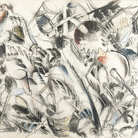 Dal 17 December 2025 al 19 January 2026
Roma | Palazzo della Cancelleria
Dal 17 December 2025 al 19 January 2026
Roma | Palazzo della Cancelleria
De Humana Mensura di Linda Karshan
-
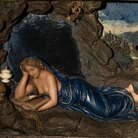 Dal 18 December 2025 al 12 April 2026
Firenze | Gallerie degli Uffizi
Dal 18 December 2025 al 12 April 2026
Firenze | Gallerie degli Uffizi
Cera una volta. Sculture dalle collezioni medicee
-
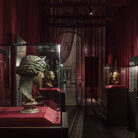 Dal 11 December 2025 al 9 April 2026
Firenze | Museo Archeologico Nazionale di Firenze
Dal 11 December 2025 al 9 April 2026
Firenze | Museo Archeologico Nazionale di Firenze
Icone di Potere e Bellezza
-
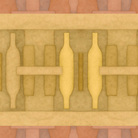 Dal 11 December 2025 al 11 January 2026
Roma | Palazzo Esposizioni Roma
Dal 11 December 2025 al 11 January 2026
Roma | Palazzo Esposizioni Roma
Giorgio Morandi nella Collezione Eni. Un viaggio attraverso la storia culturale del cane a sei zampe e l’eredità di Enrico Mattei


